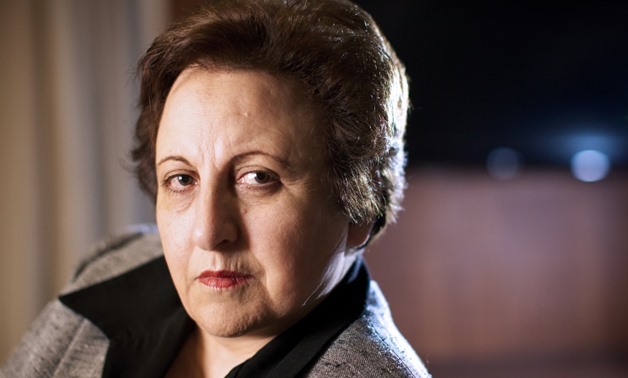
In 2003, Iranian lawyer, human rights activist, Shirin Ebadi, became the first Iranian and the first Muslim woman to win a Nobel Peace Prize – AFP/Jefferson Bernardes
CAIRO – 2 January 2018: Since 1970, Iranian attorney and feminist, Shirin Ebadi, has been defending human rights in Iran. Noble Prize winner, Ebadi, said in an interview on Sunday, that she thinks the current protests in Iran will not end soon.
Ebadi said she thinks the protests would be a beginning of a big movement, which may become more serious than the 2009 Iranian presidential election protests. “I would not be surprised if it turns into something bigger,” Ebadi said.
Since Thursday, at least 15 have been killed and hundreds have been arrested during street protests in Iran against economic hardships and alleged corruption.
“There is a big economic crisis in Iran. Corruption is nationwide and at appalled levels,” Ebadi stated. “In addition, people can no more accept watching sums of money spent on Iran’s military expenditures.”
“Youth are the most disappointed,” Ebadi said, adding that they suffer from high unemployment rate, corruption and lack of political will and power.
Ebadi affirmed that the economic state represented in the big gap between the poor and the rich; between those who enjoy well-being and those who do not, is the cause of the protests.

An Iranian woman raises her fist amid a smoke of tear gas at the University of Tehran during a protest driven by anger over economic problems, in the capital, Tehran, December 30, 2017 - AFP
Human rights activist Ebadi was born in Hamadan, Iran in 1947 and moved to Tehran a year after her birth.
Ebadi got her law degree from the University of Tehran and became a judge by 1970.
She became the first female president of the Tehran City Court in Iran, where she served from 1975 to 1979. She was forced to resign following Iran’s Islamic Revolution, according to the International Campaign for Human Rights in Iran.
Ebadi became a defense lawyer for various significant human right cases in Iran. “Twenty lawyers, who worked with us, did not make money. We had 6,000 political cases that we defended without charge. We decided to take no money,” Ebadi said in an interview with the Guardian in April.
In 1999, Iranian authorities charged Ebadi with "disturbing public opinion". However, international pressure helped reduce her sentence to a fine.
Appreciating her "pioneering efforts for human rights", Ebadi became, in October 2003, the first Muslim woman to be awarded the Nobel Peace Prize. She is also the first Iranian to be awarded the prize. Ebadi subsequently set up the office of the Center for Defenders of Human Rights (CDHR), to defend families of political prisoners.
In a press conference shortly after the prize announcement, Ebadi said, “We are against any foreign interference in Iran.” However, Iranian authorities, apparently, did not stop fighting Ebadi.
Reformist President of Iran at that time, Mohammad Khatami, commented on the prize announcement without congratulating Ebadi. Instead, he said the Peace Prize is “not very important”, and that Ebadi was awarded the prize based on “totally political criteria”.
Ebadi released a statement in 2008, where she said that threats against her and her family’s lives and security have been intensified.

Former Prime Minister Mir-Hossein Mousavi inside the crowd on the 6th day of Iran’s 2009 protests – Flicker/Hamed Saber
In 2009, Iran held presidential elections that ended in protests against the results, as conservative Mahmoud Ahmadinejad won the race. Mir-Hossein Mousavi, former Iranian prime minister and the main opposition candidate warned that he “will not surrender to this manipulation".
Amid protests, on December 8, 2009, Iranian authorities arrested Ebadi’s sister, Nushin, at her home. Ebadi said that her sister is not engaged in any political activity, and that the authorities stated that they arrested her to force Ebadi to stop her political activities.
The Iranian Government, according to Ebadi, confiscated her assets, including the CDHR and her bank account, filing a case against her in the revolutionary court.
Norway’s Foreign Minister Jonas Gahr Støre said in a statement that the Iranian authorities had also confiscated Ebadi’s Nobel. Iran denied these allegations.
A few months after the elections took place, Ebadi’s husband was arrested and sentenced to death over charges of adultery. Iranian authorities made a deal with him – discrediting Ebadi publicly in return for freedom, Ebadi told The Guardian. Consequently, he said that Ebadi serves foreign imperialists who seek to weaken Iran and was awarded the prize to help topple the Islamic Republic.

FILE - Hassan Rouhani
The fear of jail pushed Ebadi to leave Iran for London, where she has lived in exile since 2009, but this has not stopped her from defending Iranian human rights. Ebadi has expressed concerns over growing human rights violations in Iran since the victory of Hassan Rouhani in Iran’s presidential elections in 2013.
“The fact that I am in exile [does not] mean that I am scared of going to prison. If I am in prison in Iran, I will not be useful [to the] people in my country. Here, I can be the voice of my people and tell the whole world what goes on in my country,” Ebadi said, commenting on her memoir, “Until We are Free: My Fight for Human Rights in Iran.”




Comments
Leave a Comment